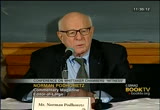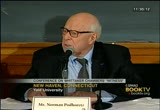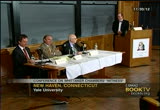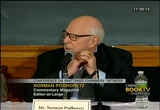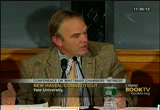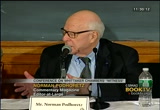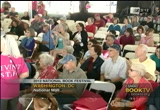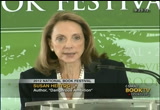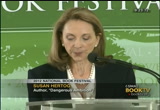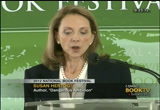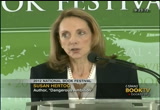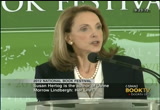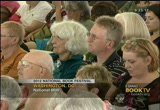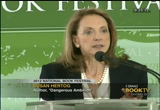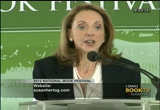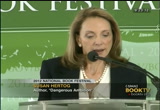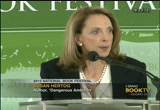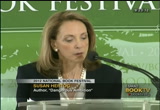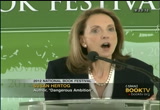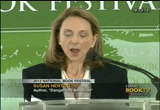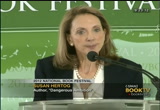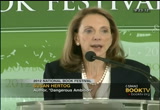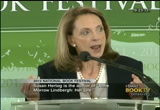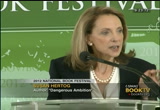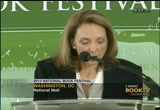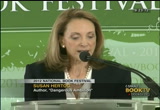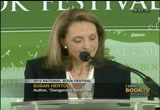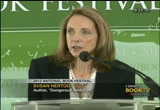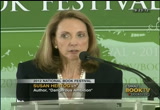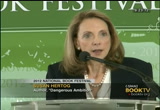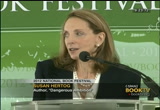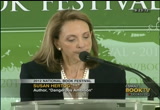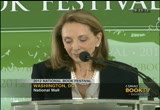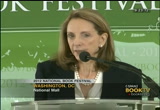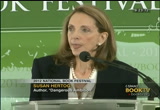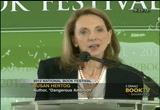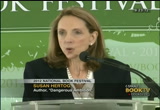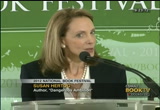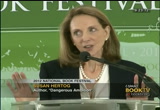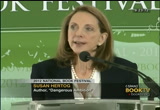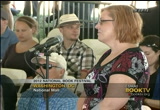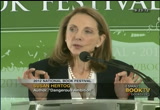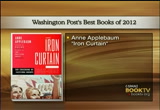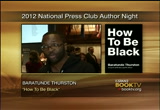tv Book TV CSPAN January 2, 2013 5:15am-6:00am EST
5:15 am
such. we have a president, who unfortunately, has been reelectedded whom as we know promised before he was first elected, five days before, to radically transform this country. we know pretty well what he issues to trueness form it. we say politely a fake fake facsimile of the western europe. that's the least of it. i mean, that would be the minimal strategic objective of our president and his administration. limited government, yes, and we have to think about which what we can and can't do. like, i mean, -- but i think we have to bear in mind that we lost this last battle on november 6th, the war is by no means over on the contrary. and i think that if unless we
5:16 am
keep it in focus, unless we keep reminding ourselves that the stakes in many particular war about as great as they can be, we're going lose. and it's got nothing to do with whether there's another regulation of the banks or, you know, whether taxes go up on the rich or don't go up on the rich. i don't don't say they are unimportant. they are tactical or intermediated measured involved in a strategic objective that i think barack obama is very clear about, and is determined to pursue and, god help us may it succeed in doing. [inaudible] [laughter] >> i want to add briefly and commenting on what norman said about those who love america and those who don't love america. i would like to add a quote from
5:17 am
bill buck lee showing that how much you could love america -- [inaudible] and it's the line from the genesis of oaks in which he says, this country of ours so crazy and mixed up much of the time, and yet, still worth everything. >> well, of course it has flaws. everything has flaws. e everything human has flaws. the question is what you emphasize, and what has been emphasized in our culture for well forty years now, it was increasing intensity, is the flaws. i mean, you've got several generations of kids who have been educated to believe that the country stinks. it was born in sin and continued to be pursue evil object is, et. cetera. that's why i keep harping on this issue. i still think it is the major
5:18 am
issue facing us, and conservatives, at least of not all strifes, i have to sigh, are the only force in the country that can be relied upon to -- well, at los, i think stop it. this particular history, i think, we can yell stop and it can succeed. we can draw on the deepest resources of the country's tradition to fight it. and but if we don't, nobody else will. and the battle will be lost. >> receipt me bring it back to whittaker claimers. the fact it looks like losing battle doesn't mean you don't do it. when chambers confronted communism. he was confronting the entire american establishment. everything was against him. i'm sure it looked like -- it looked very clearly that it was something he couldn't imagine he was going diseed.
5:19 am
but he did it anyway. he the courage to do what he did, and each of the those steps, i mean, testifying was an enormously courageous thing to do, when his challenge to make the accusation that he was spy outside of the congressional privilege. he went on to see the -- yeah. an enormous courage and ultimately he prevailed. >> yes. good bid i -- he was a great man and witnesses as a great book. but i do think that he never dropped the other shoe, and this this weekend his own fight against communism. and rereading "witness" i've been struck by how much the resistance sighing america as -- seeing america as good. you can say relatively good. he said that communism was absolute evil. i believe that. and i would not say that america
5:20 am
5:21 am
here at the library of congress book festival, but perhaps i'm even more honored to having been introduced by the extraordinary man, dr. james billington him a great man and a great librarian of congress. [applause] thank you. i will start at the beginning. as a child i loved to read. in the mid '50s, live in the outer boroughs of new york city, in my case the bronx, was comfortable but provincial. and my curiosity extended far beyond the bounds of my home and school. i wanted to know more about people in other places.
5:22 am
what was happening in the world now, what had happened in the past, and quite simply how i came to be. books were my passports, and i consumed them voraciously. but i came to writing later than most. in my late '30s after having raised my three children. my generation, those of us born during and after world war ii, numbered in the millions. and we were asking questions that demanded to be answered. we had come of age in the heat of the escalating war in vietnam. and we didn't know why our
5:23 am
brothers were fighting so far away for a cause that was so difficult to understand. and the role of women in society was changing rapidly. my friends, educator with traditional values but a deep sense of personal ambition, wanted to know how to be true to ourselves, yet remain committed to our husbands and our children. as a young mother i had stumbled into a bookstore and told gift from the sea off of the bargain shelf. it's author was struggling with the very same questions that we were asking ourselves. her answers were deceptively
5:24 am
simple, and yet they ring true. and i wanted to know how this woman got so smart. and so, rising before dawn, i climbed the stairs to my third floor room. yes, dear virginia, a room of my own, to read lindbergh's work, to study its historical framework, and to jot down my thoughts before sending my children off to school. my biography of and lindbergh would take more than 10 years to complete. during which i had the rare privilege of meeting her. 10 times. but the book was more than a
5:25 am
biography. it was a journey towards self-knowledge, during which i developed a consuming interest in understanding the lives of women. not only women thinkers, but doers. women who were willing to enter the public fray and change the discourse. what were the qualities of person and mind, the value and loyalties of those women who succeeded, and what did they have to sacrifice to bring their goals to fruition? while researching the lindbergh book, two names kept cropping up. dorothy thompson, an american journalist, and her friend of 40 years, rebecca west, journalist,
5:26 am
novelist, literary critic and historian. they eat atomized the kind of woman i was searching for. they play for high-stakes, whisking personal pain for public voice and influence. think of it. two generations before the baby boomers were born, these women had the courage to throw off convention, defy social expectation and catapult themselves into the public arena at a time of roiling political and social upheaval. and against the headwind of their contemporaries, i mean, they were ridiculed.
5:27 am
and with none of the safety nets we take for granted today. and to compound their struggle, they had no family connection, no money, and had fractured childhoods. let me begin with dorothy thompson. born in 1893, the english irish parents in a small town in northern new york state, she was the eldest of three children whose preacher father taught them first to love jesus. second, do all day the christian epic. and third, to embrace the
5:28 am
written and spoken word, in that order. but after the death of her mother when she was only eight years old, everything changed. for two years she helped take care of her younger brother and sister, and to cater to the needs of her brokenhearted father. but when her father remarried, his rebellious and precocious teenager was cast out on her own. after graduating from college, she cut her teeth as a spokesperson for the women's suffrage movement. and then doing a short stint as a kennedy organizer, -- community organizer, she realized that she was slated for a life beyond the bounds of
5:29 am
cleveland, and even new york. so in 1921, with $150 in her pockets, determined to become a foreign correspondent, she went to england with the desire to make her way through the wilds of fleet street. but what's remarkable is that within five years she became the first woman to head a news bureau in europe. station in berlin, she saw a world in chaos, and she hunkered to understand that madness that seemed to be sweeping europe.
5:30 am
the public and local upheaval after the great war, and the political landscape that was giving rise to ruthless dictators. she wanted to be a player, and she knew that as a woman she would have to fight harder, faster, and longer than her male colleagues. she would have government officials, prime ministers, presidents, and earned a reputation as a reporter willing to do anything, and go anywhere, for the sake of a story. thompson had the guts to ask the american public the questions they did not want to think about. mired in the delusion that they were protected from asian and
5:31 am
european to mold by tuitions, americans preferred the roar and affluence of the 1920s, dancing and drinking themselves into oblivion. in 1933, after knocking at his door for seven years, thompson would become the first foreign correspondent, male or female, to interview hitler as he was gaining dominance in the reichstag, and ruthlessly cutting his way to public, to government control. her book, "i saw hitler,"
5:32 am
catapult her on the national stage and earned her the distinction of being thrown out of a nazi right. along with national celebrity and the total generation of her peers. but as thompson's influence grew, her voice echoed across america and europe. just listen to this. in 1936, she was writing a thrice weekly column in "the new york herald tribune" that reached eight to 10 million readers a day. and by 1937, she had received six honorary degrees from major colleges and universities. and a public radio broadcast on
5:33 am
nbc that reached 5 million readers, listeners, and she was rumored to be running for the u.s. senate. that was true, but she was also thinking of running for president. in 1942, through shortwave radio broadcast, she would reach millions of ordinary citizens in germany, hoping to bring hitler down by convincing them that he would enslave them and free, free people around the world. within a span of 20 years, she had gone from being a nobody, a
5:34 am
community organizer in cleveland, to a powerful international figure. but her personal life was in shambles. while she had been working in berlin in the early and mid 1920s, she had been swept off her feet by harry sinclair lewis, whom you know as perhaps one of the greatest writers of the 20th century, and was soon to become the first american to be awarded the nobel prize for literature. he had already written mainstream, babbitt, and aerosmith. and was about to publish elma gantry. she was drawn to him, not only because of his litter or
5:35 am
brilliance, but because he was the saddest man she had ever met. and dorothy thompson, the preacher's daughter, like nothing better than to save someone's soul. he in turn was drawn to her strength, her morals, her driving energy and her unwavering ambition, and her indomitable drive. but within a short time she realized he was and in court jubal drunk. -- in court jubal drunk. and despite his own international celebrity, he could not spare her rising thing.
5:36 am
rebecca west who have met thompson in london in 1921, whom jim spoke about in his introduction, and later when dorothy was a chief of the bureau in berlin, was as courageous and as an domino ball as american friend, possibly more so. kindred spirits intent on breaking through that concrete ceiling of male-dominated literature and journalism. they both were intent on confronting the pivotal issues of their times head-on. and they would remain friends all of their lives. rebecca west had as humble a
5:37 am
beginning as dorothy thompson eric she was born so silly isabel fairfield on the outskirts of london in 1892 to a scotch highland mother with musical aspirations, and a truly gifted journalist father. when he left them, abandoned them to poverty, when she, too, was only eight, she was both devastated and liberated. as angry as she was, she, like thompson, was able to invent herself. noddy and rebellious,
5:38 am
ms. fairfield first tried to be an actress, which was a terrible thing for a respectable woman to do. but early on she realized that her true passion and her true ability was the spoken word. and she became a feminist journalist as a tool for initiating social change. by the age of 20 she had earned a reputation as a serious polemicist, and by the age of 30, she was not only a journalist, she was a literary biographer, a novelist, and a literary critic with a scathing reputation.
5:39 am
for 40 years, rebecca west took britain by storm. are writing cut across every genre, from fiction to nonfiction, and the range of her knowledge was wide and deep. she can truly be called a public intellectual, in the sense that lionel trilling defined it. one whose writing land at the crossroads of literature, the bloody crossroads of literature and politics. and west, like thompson, was among the very first to perceive the oncoming danger of nazi devastation. although by nature she was more of a moral philosopher and intellectual than a journalist,
5:40 am
like thompson. she nonetheless traveled alongside her banker husband as he was an emissary with schroeder's bank, a german bank. and was commissioned by the british government to investigate and understand countries across eastern europe. on one of these assignments she went to yugoslavia, and the trip changed her life. from a distance she could see the disintegration of british culture. and its political -- at a time when great steaks were on the
5:41 am
table, with more clarity than ever before. the result was her magnum opus, black lamb and grey falcon, a political military and cultural history of yugoslavia that in her hands became a microcosm of tribal contention and foreign conquest that altered the face of europe under nazi siege. it was a 1200 page clarity and call to arms. meant to awaken her compatriots from the deep white sleep of
5:42 am
appeasement. to the ruthlessness of hitler and mussolini. and the devastation of the democratic ideals, their ascendancy implied. but black lamb was just one of her more than 30 books. along with hundreds of essays and articles she wrote during her lifetime, in american and british periodicals. "the new republic," "the new yorker," u.s. news and world report, the "evening standard," "the daily telegraph, the spectator, just to name a few. in which she grappled with a dazzling array of issues that
5:43 am
actually defined the essence of life in the 20th century. democracy versus totalitariani totalitarianism, nationalism versus the new internationalism, the legal and moral intricacies of punishing war criminals, the meaning of treason, the validity of christianity, and the silence of god. but what was astonishing about rebecca west was that she never went to university. early on she understood that she was smarter and more capable than her classmates, or even her children -- her -- sorry, probably, probably her son.
5:44 am
but also her teachers. she was an autodidact, great philosophy, theology and philosophy. managing to out perform and outclass those of high birth and formal education. throughout her career she was honored with the middle, from america and france. but her coup de grace came in 1959 when queen elizabeth awarded her game commander of the british empire for her contribution to 20th century
5:45 am
literature. now, how do we account for the success of these two women? pure raw intelligence and drive, certainly, but there were other smart and ambitious women. what distinguished thompson and west was their courage to jettison the constraints of the past, break the rules and forge a path for women in journalism and literature at a time of great political upheaval. their influence was of perception, character, drive, and the guts to speak truth to
5:46 am
power, at a time that was cataclysmic in world history. in short, they felt an overriding sense of historical mission, and were willing to do everything to make their voices heard. but there was a danger in their ambition, a dark side, which is exactly why i named my book "dangerous ambition." it was certainly heroic, but risky to throw away the rules and make new ones up on the fly. at the cutting edge of such
5:47 am
change, they had no understanding of who and what they were sacrificing. so intent on achieving their goals, even when they had the slightest glimmer that they were hurting those whom they loved, they chose to turn away, caring more about humanity then those people in their personal lives. their relationships with men ended either in divorce or in deep antipathy, and their sons feeling abandoned and alone, spend much of their lives trying to bring them down.
5:48 am
dorothy thompson son, michael lewis, the issue of her contemptuous and ultimately failed marriage to sinclair lewis was a lost and lonely young man who became like his father, an alcoholic. he could never measure up to his parents expect nation. and although he had a gift for acting, he ultimately succumbed to invalids and philandering. destroying the lives of his wife and his children. rebecca west's son, anthony west, was a product, and some of you may know this, of our decade long relationship with h.g.
5:49 am
wells, whom, as you know, was one of the most celebrated authors in the english language at the time. whose legendary books are still read today. he was 46, married with two sons, and when they met. and west was a mere girl of 19. who was easily, and i might add, willingly, seduced by his intellectual brilliance and rapacious sexuality. he had indeed -- wells had indeed met his match in rebecca, but each was as ambitious and self absorbed as the other. and their union quickly
5:50 am
unraveled, but it was their son, anthony, who would pay the price. caught in the middle he hunkered for love that neither one of his parents could give him. and though anthony himself was a gifted writer, he chose to siphon his creative energy by punishing his mother for his illegitimate birth. she became through his eyes force of deception, corruption, and mendacity. but it may be said that neither west now are wells, nor thompson nor lewis, had the slightest notion of how to love one another, or their sons.
5:51 am
although thompson and west were flawed and imperfect heroines, we are the beneficiaries of their legacy, undaunted courage, in domino ball energy, -- indomitable energy, "speaking truth to power" regardless of its costs. they grappled with the great political and moral issues of their times so that we might harness and clarify their vision to meet the imposing exigencies of our print. thank you so much for coming and for listening. [applause] >> and.
5:52 am
>> if you have questions, we have two microphones on either side of the center section. please let us know if you have questions. susan hertog is going to answer them for just a few minutes. thank you. >> you mentioned that thompson left for england with $150. really without any track record of any career in journalism. how did she actually break in in london? i know she became the first foreign correspondent within five years but how did she actually breaking did in? >> well, she went to the international news service, and volunteered her services. she said, don't pay anything. just give me assignments. and i'll do whatever you want me to do, and i promise to bring back the story.
5:53 am
and that's how she made her way into journalism, into foreign correspondents. she was picked up later by the "new york post," and as you heard me say, she was indicated in 180 newspapers around the country. and reached eight to 10 million readers a day. but the answer to your question is, by pure, raw guts. she knew she could do it. she didn't care if she got paid for it. she knew she could bring that story home, and do a good job. >> i'm curious about your
5:54 am
primary sources. the story, i was reading the book, and there's a story of dorothy's mother's passing, how did you research that and how did you bring that to sort of an amazing narrative? i'm just curious, what your primary sources were? >> i think you're speaking about the fact that her mother had a botched abortion at the hands of dorothy thompson's grandmother, who decided that she had enough children, thank you, and she was poor as a church mouse because she was married to this preacher who was a good man, but he wasn't bringing home the bacon. and there were all kinds of herbal and concoctions, one of which she formulated and used
5:55 am
on, for poor margaret grisham, and, unfortunately, her mother died within hours. the source material was, as i said in my introduction, came from great researchers who, on whose shoulders i stand, particularly teater kirk -- peter kirk who understood the story, who had gone through all the papers, and the people in the congregation had heard these rumors and soon they came back to dorothy thompson. and she was mortified. i think that's partially why she became interested in the women's
5:56 am
190 Views
IN COLLECTIONS
CSPAN2 Television Archive
Television Archive  Television Archive News Search Service
Television Archive News Search Service 
Uploaded by TV Archive on

 Live Music Archive
Live Music Archive Librivox Free Audio
Librivox Free Audio Metropolitan Museum
Metropolitan Museum Cleveland Museum of Art
Cleveland Museum of Art Internet Arcade
Internet Arcade Console Living Room
Console Living Room Books to Borrow
Books to Borrow Open Library
Open Library TV News
TV News Understanding 9/11
Understanding 9/11